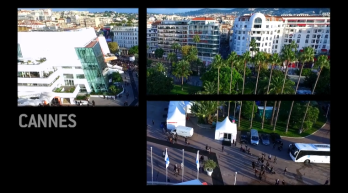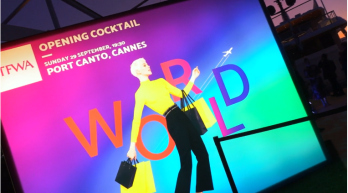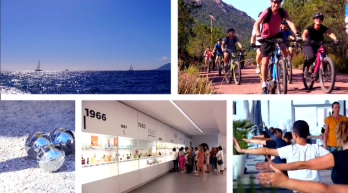

Opening the 35th TFWA World Exhibition & Conference, TFWA President Alain Maingreaud detailed the “challenges and opportunities” facing the duty free and travel retail market. “Things are changing fast for our industry. This is my first global summit as President, but I’ve been involved with TFWA since 1995. During that time, the landscape has never shifted more quickly than now. Technology, regulation and geopolitics are rapidly reshaping traveller habits.”
Paving the way for the future
Maingreaud highlighted the significant developments that had been introduced to this year’s TFWA World Exhibition & Conference, including the launch of the new TFWA Innovation Lab. “Housed in a dedicated space opposite the Majestic Beach, around 30 exhibitors specialising in digital and mobile tech, traveller research, sustainability, CSR and more will demonstrate smarter ways of doing business in duty free and travel retail.”
Attendees were also encouraged to visit the new Innovation in Action workshop to learn more about the latest news from leading companies including Amazon Pay, Alibaba and Concourse Display Management. Wednesday’s Inflight Focus workshop, featuring speakers from AirAsia, Cathay Pacific and omnichannel marketplace Airfree, was also a must-see, according to Maingreaud. “Given the structural changes currently facing the inflight market, with some carriers reviewing their approach as new technology offers alternatives to the traditional duty free trolley, that promises to be another fascinating session.”
The scope and accuracy of our data
Moving on to the wider duty free and travel retail business, Maingreaud stated that more must be done by the industry to capture and share relevant market data. The slide he showed at this stage of the conference was a simple question mark. This was, he said; “simply because of our collective failure as an industry to agree on a standard, internationally consistent benchmark for measuring the market.
“Growing concerns about the scope and accuracy of the sales information available to date have led some to question its validity. Yet until we can overcome our reluctance to share the data that is the lifeblood of our industry, we shall be flying blind. What other multi-billion-dollar business makes decisions without even the most basic statistics to monitor its progress?
“We cannot afford to leave this issue unaddressed. It is time to act, and TFWA stands ready to support any credible proposals for bridging the vast gap in data provision that currently confronts us. If we don’t know what is happening in our own industry, how can we educate others about what we bring to the travel industry? How can we show governments how their decisions will have an impact on us? And how can we make informed decisions on the future of our market?
“Again, we must act now to address the lack of reliable data in our industry. At stake is nothing less than the sustainability of duty free and travel retail.”
Business sustainability
The subject of sustainability has been making many headlines around the world recently, especially in connection to the environment. Maingreaud believes sustainability in its broadest sense – the ability of something to be maintained without exhausting resources – should be the duty free and travel retail industry’s main concern.
“Whether our business is sustainable depends on a number of factors. Some, such as a stable economy for international trade and a political climate that encourages openness, are beyond our control. But there are other factors that we can influence. I’ve already mentioned the importance of data-sharing, which is linked to the industry’s current business model. The concession system in operation at most airports rewards the landlord while leaving retailers and brands to bear much of the risk that accompanies international passenger flows.”
“Some progressive airports recognise that sharing the financial burden when traffic falls below expectations makes sense for all parties. Rigidly applying a minimum annual guarantee or percentage of sales, even when traveller footfall is weaker than predicted, merely incentivises retailers to take a short-term view, maximising current returns rather than investing in the product range, store environment and staff training for future benefit.”
“Brands are inevitably asked to help fill the retailer’s subsequent profitability gap, and the retail experience itself suffers as tired-looking airport shops do little to engage travellers and risk driving them to spend their money elsewhere.”
“The solution to this dilemma,” added Maingreaud, “is a better-balanced relationship between landlord and retailer where the risks and the financial rewards of airport retailing are spread more evenly between the parties.”
“I’m aware that none of what I’m saying here is new, but that doesn’t make it any less worth repeating. To achieve an enhanced shopper experience that works financially for all stakeholders, we need to redesign the framework within which brands, retailers and landlords co-operate. If the relations between stakeholders are unfair and unbalanced, ultimately everyone will be a loser. Our industry can only be sustainable if it is sustainable for everyone.”
The damaging effect of regulation
Heavy-handed regulation is presenting further threats to business, said Maingreaud. “It can endanger the profitability of successful airport concessions, leading established retailers to withdraw from bidding when those concessions come up for renewal, as we have seen in recent months.
“Product labelling requirements are a further example of regulatory threat. They can erode the distinction between sales to travellers and sales on the high street, further reducing the attraction of duty free and travel retail. Industry associations have a key role in explaining the unique nature of our business to legislators and authorities at national, regional and global levels. This is why your support for bodies who lobby on our behalf is so important.”
Thought for the environment issues
From an environmental perspective, continued Maingreaud; “the sustainability of our planet is directly linked to human activity and our readiness to reduce the damage caused by CO2 emissions along with other forms of pollution.
“As I said at the TFWA Asia Pacific Conference in Singapore earlier this year, our industry began at an airport and still earns most of its revenue from air travellers. We cannot ignore the negative impact that aviation has on the environment. It’s true that other sectors emit far more in absolute terms – global power generation for example produces more than 10 times as much CO2 as flying, according to the International Panel on Climate Change. But aviation still accounts for roughly 2% of worldwide greenhouse-gas emissions, and new studies suggest the overall climate impact of flying could be closer to 5% of all warming caused by humans. European Union research states that someone flying from London to New York and back generates the same emissions as the average EU citizen heating their home for a year.
“Recent protests by climate activists have given this issue greater prominence. We may not all suffer from flight shame, a term coined in Sweden to describe the feeling of embarrassment at boarding a plane because of its negative environmental impact, but growing numbers of consumers are questioning the climate credentials of the companies they buy from. Big institutional investors are likewise putting greater emphasis on the environmental, social and corporate-governance performance of companies when deciding where to place the money they manage.
“Unless we in duty free and travel retail start to act on climate change, and are seen to be doing so by consumers, investors and governments, we risk appearing arrogant and out of touch with today’s travelling consumers. Some major players in our industry – brand-owners and retailers among them - are already active in this area. But even small steps matter, helping to create a sustainable mindset, and the cumulative effect of initially small actions taken by many can quickly become significant.”
Coming back to Cannes
Listening carefully to members as well as the exhibitors and visitors who attend our events, and responding to their needs is vital to ensure the sustainability of TFWA itself, said Maingreaud. “The timing of the Cannes week is one example. Finding dates that avoid a clash with national and religious holidays is difficult at a global event like this. Our current late-September schedule may not suit everyone, but it was chosen after wide consultation and represents the best compromise.”
“TFWA’s sustainability requires us to build on the platform we already have,” he continued. He then went on to announce the signing of a new contract with the Palais des Festivals, which will see the TFWA World Exhibition & Conference return to Cannes for at least the next three years.
“Delegate surveys show a strong preference for remaining on the Côte d’Azur, which this latest agreement achieves. At the same time the Association must evolve and adapt to the changing landscape of duty free and travel retail that I referred to earlier. Our own insight programme, TFWA Research, tracks emerging and established traveller trends and attitudes via a comprehensive catalogue of specially commissioned studies to which we are constantly adding.”
For the benefit of the industry
Maingreaud said TFWA has continued to work closely with its trade partners to create new innovations that will benefit all industry professionals. “We have recently lent our support to the launch of a new resource: a dynamic online industry map showing the commercial activities at the world’s top 100 airports. Known as the ‘TR Toolbox’, it provides details of store operators and products sold and, in time, it will expand to include other airports and other travel retail sales channels.
“A search engine based on key media and published business intelligence will let users search for information by company, sales channel, region and further industry parameters. This venture has been developed by Contineo Labs / Generation Research, and TFWA members will have cost-free access to the content, which will be updated on a regular basis.
“Our mission of being a positive force that helps the industry to grow underpins our support for the Duty Free World Council and its latest initiative, the DFWC Academy. The Academy provides a framework of accredited training modules through which frontline retail staff can develop their skills and earn professional qualifications that are recognised internationally. The Academy will have an information desk here in the Palais throughout this week. I urge everyone in the duty free and travel retail community to support this new initiative. Research consistently underlines the importance of staff interaction with travellers for a positive customer experience and an uplift in sales per capita. Any steps to enhance the professionalism of our staff in-store will benefit us all.”
Positive outlook
Despite a number of threats, Maingreaud’s view of the future of the duty free and travel retail industry remains positive. “The challenges posed by data- sharing, a compromised business model, climate change and the other problems I’ve raised this morning should not be underestimated. But then neither should our industry’s talent for reinventing itself, especially when confronted by disruptive change. Co-operation between stakeholders may appear to be minimal, but it does exist and, with goodwill and a shared interest in the development of duty free and travel retail, it can grow.
“Many who come to work in our industry choose to stay within it, contributing to an already substantial fund of experience and expertise that can be deployed for the benefit of the business as a whole.
“The wide and growing range of products we sell to travellers is another source of strength, a downturn in one category often being counterbalanced by growth in another. And the need to highlight our channel’s unique status has helped us to innovate, developing exclusive offerings that cannot be found outside duty free and travel retail.
“We have good reason to be confident in our own ability to meet the challenges confronting us if we can come together and act for the benefit of the industry as a whole.
“The latest TFWA Asia Pacific Exhibition & Conference in Singapore underlined the sheer vitality of duty free and travel retail in its largest market by turnover.
“Despite the escalating trade war between Washington and Beijing and slower growth in the Chinese economy, passenger traffic in and around Asia continues to rise. All the indicators suggest that our sales to travellers in the region are still advancing strongly, and that Asia’s momentum is offsetting lower growth in Europe and the Americas to keep global industry turnover progressing at near- double-digit rates.”
Looking to the future
Concluding his speech, Maingreaud urged delegates to work together to ensure the industry continues its upward trajectory in the future. “Let us harness that energy to drive the next phase of our industry’s development, demonstrating our ability to solve internal issues while securing the future of duty free and travel retail as an integral part of every journey.
“Accelerating our adoption of digital and mobile technology will ensure we keep pace with traveller expectations and enrich the in-store experience.
“Meaningful action on environmental protection will show we are aware of our responsibilities and take consumer and investor concerns seriously.
“Engaging with regulatory authorities and governments will enable us to explain why duty free and travel retail is different from the high street, generating jobs, funds for infrastructure investment and greater consumer choice.
“Taking a proactive approach on these issues now, while we still have our future in our own hands, will help us ensure the long-term sustainability of our industry.”



